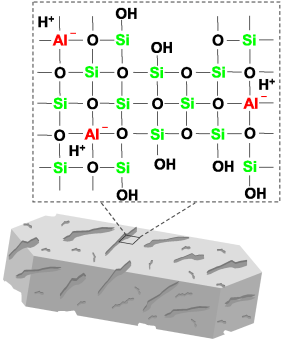The role of the concentration and the nature of aluminium in the creation of hierarchical porosity in both commercial and synthesized MFI zeolites have been investigated through controlled mesoporosity development by desilication in alkaline medium. Framework aluminium controls the process of framework silicon extraction and makes desilication selective towards intracrystalline mesopore formation. An optimal molar Si/Al ratio in the range 25-50 has been identified; this leads to an optimal mesoporosity centred around 10 nm and mesopore surface areas of up to 235 m2 g-1 while preserving the intrinsic crystalline and acidic properties. At lower framework Si/Al ratios the relatively high Al content inhibits Si extraction and hardly any mesopores are created, while in highly siliceous ZSM-5 unselective extraction of framework Si induces formation of large pores. The existence of framework Al sites in different T positions that are more or less susceptible to the alkaline treatment, and the occurrence of re-alumination, are tentative explanations for the remarkable behaviour of Al in the desilication process. The presence of substantial extra framework Al, obtained by steam treatment, inhibits Si extraction and related mesopore formation; this is attributed to re-alumination of the extraframework Al species during the alkaline treatment. Removal of extraframework Al species by mild oxalic acid treatment restores susceptibility to desilication, which is accompanied by formation of larger mesopores due to the enhanced Si/Al ratio in the acid-treated zeolite.
